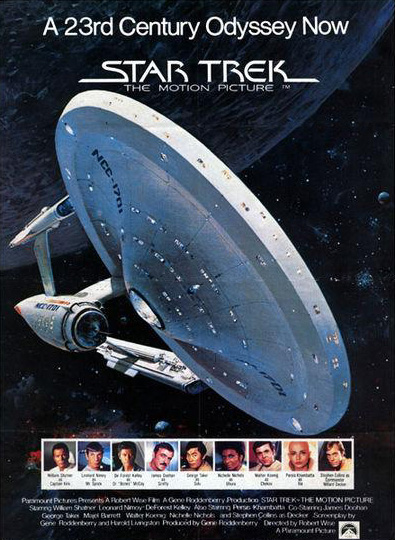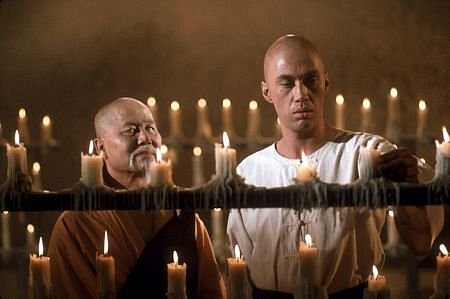 Thirty-five years ago, today, Star Trek: The Motion Picture debuted around the nation.
Thirty-five years ago, today, Star Trek: The Motion Picture debuted around the nation.
Frequent File 770 contributor James H. Burns recently found this short essay in his notes, written some time ago and offered it to commemorate the occasion.
By James H. Burns: It’s part of the popular mythology that Star Trek: The Motion Picture‘s storyline was ruined by Paramount’s executives…
The weakness of the characters in the film was largely the result of Gene Roddenberry’s diminished writing abilities — and then further rewrites, by someone who didn’t fully understand the characters — which were in turn, further convoluted by more rewrites by Roddenberry…
While Roddenberry’s rewrites on the original series often led to some fun stuff, the material in STTMP, was, obviously, not too great…
(In a funny aside, once STTMP’s shooting schedule went way over its predetermined shooting schedule, William Shatner and Leonard Nimoy, by contract, had to be consulted over every rewrite… Towards the end of the filming, there were daily meetings, with them, consulting on the script…
(But, perhaps not surprisingly, some of their advice may have led to some of the better character moments in the movie…)
A lot of the worst stuff in the film, comes directly from Roddenberry’s original drafts — including the fact that it was only a mediocre reworking/remake of two earlier episodes (“Doomsday Machine”/”Changeling”).
As good an EXECUTIVE Producer as Roddenberry once was, and as remarkably creative as he could be at one time, it’s important to remember that by 1979, Roddenberry HADN’T WRITTEN A SCRIPT ON HIS OWN in almost fifteen years…
Roddenberry’s greatest talent may always have been as a format originator, and as an executive producer, but only when (for the latter), there was a strong/talented producer working under him…
One of the many reasons for the failure of STTMP was that Roddenberry was acting as a producer. He either needed a good producer working with him, who had an active sense of what made the original series great (say, a Dorothy Fontana, or David Gerrold, for example), or a director who knew and understood the Show — which, Robert Wise, as great as he had once been, was not.
By the time of STTMP, Wise hadn’t directed a truly engaging film, in ages…
If you like the later Star Trek films — and, personally, I don’t,
Particularly — thanks belongs to others.
This was quite a controversy at the time, but Roddenberry had virtually nothing to do with their production. Contractually, Paramount had to show Roddenberry script drafts, and tell him about other creative moves — but they were not forced to listen.
(Sadly, by the time of the later films, word is that even many of Roddenberry’s memos, went, relatively, unanswered…)
Harve Bennet, and later Leonard Nimoy, were the producers who controlled the films…
Speaking of which, I always thought that what Nimoy did with Spock in the movies, was a bit strange…
Character growth, from the teleseries, would have been fine — but I’m not too sure that what we saw in the movies, had much to do with that original character…
It was almost as though Nimoy became infatuated with the idea of Spock as some kind of mystic… Almost as though he wanted to make him more like another TV pop culture icon, this one from the early 70s:
Kwai Chang Caine.
Don’t laugh here, but the Spock of the later films sometimes seems to bear much more of a similarity to David Carradine’s character from Kung Fu than the 1960s Vulcan…
Discover more from File 770
Subscribe to get the latest posts to your email.


There’s a lot of food for thought here, but I’m in no position to think about it since I don’t seem to have heard any of those popular misconceptions that James Burns spoke of. Somehow I managed to go through life just thinking ST:TMP was bad because it was just bad. Who wrote the bad scripts, who directed the bad scenes, who edited the bad final cut never really worried me. But I will say this, Burns’ thoughts on the film Spock are right on. There were hints in the TV show that the Vulcan race was not the logical, pragmatic civilization the presented themselves as, but the movies made it clear that there was as much logic to Vulcan culture as there was to Chinese New Year or a Bar Mitzvah. It was a culture heavily steeped in irrational traditons and mysticism, and Spock was as wooly-headed as any pot-smoking, macrobiotic, I-Ching guided, tied-dyed hippy.
Way back then, in an apazine (possibly in TAPS, Mike) I once made a similar comparison between Kwai Chang Caine.and Spock – their unemotional stoicism, the fact that each was mixed-race …